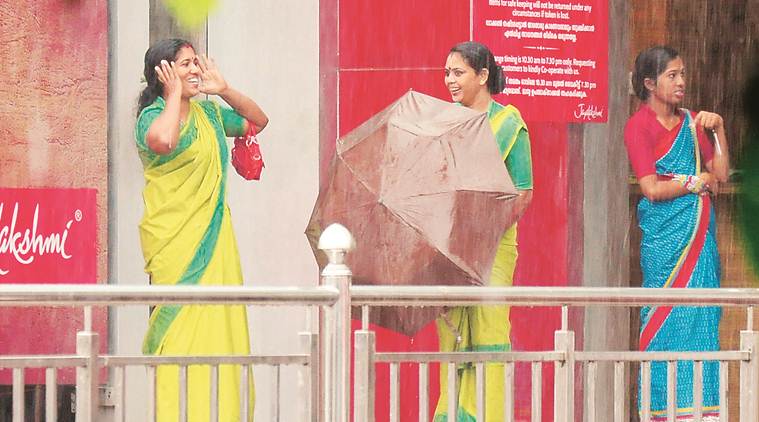- India
- International
The whole nine yards: How Kerala’s saleswomen won protracted battle for their right to sit
When the Kerala Cabinet cleared a key amendment to the shops Act, women standing behind sales counters in the state’s showrooms cheered. They had won a hard-fought battle for their right to sit.
 Outside a showroom in Kerala. Women employed in showrooms across the state work long hours for meagre pay and can take few breaks. (Express Photo: Anoop K Venu)
Outside a showroom in Kerala. Women employed in showrooms across the state work long hours for meagre pay and can take few breaks. (Express Photo: Anoop K Venu)
Sajna V P stands and stands. For 9 and a half hours at the textile showroom in Thrissur, Kerala, where she works, and then for 45 minutes hanging on to the straphanger of the state transport bus she takes to get home to Puthukkad, 18 km away. “I rarely get a seat in the bus, but I am used to standing,” says the 36-year-old, waiting at a bus shelter at Swaraj Round in Thrissur one late evening.
“I am up on my feet from the minute I wake up. When I leave for work in the morning, I am usually late and can’t afford to wait for a bus with vacant seats because if I am late to work for four consecutive days, I will lose a day’s wage. At work, I get to sit only for half an hour, during the lunch break. Even after I get home after nine hours of work and the bus ride, I have chores to finish so I rarely get to sit down,” says Sajna, who has been working at the Thrissur showroom for two years for Rs 300 a day.
Last week, the Kerala Cabinet cleared an amendment to the Kerala Shops and Establishments Act, 1960, to ensure a “secure environment” for working women. The draft Bill now allows women to work in night shifts — at present, such establishments can’t have women working between 7 pm and 6 am – and directs employers to ensure women on night shift are dropped home after work. It also states that the total working hours, including overtime, will not exceed 10 hours a day and that employees are entitled to breaks after working for more than five hours at a stretch. But it’s a particular clause in the new Bill that has drawn the most attention — the right of women employees in shops and establishments to sit during their long work hours.
Kerala, whose economy is driven by urbanisation and consumption, houses some of the most extravagant retail showrooms, primarily for gold and textiles. According to unofficial estimates, around four lakh people work in textile showrooms in the state, over 90 per cent of them women from socially and economically weaker sections of society. The ‘right to sit’ has been a long-standing demand of employees in this unorganised sector.
On July 1, 2016, the National Human Rights Commission issued a notice to the Kerala government on the poor working conditions of women at textile shops in the state.

The proposed Bill is a culmination of separate agitations over the years in the districts of Kozhikode, Thrissur and Alappuzha, led by groups of women retail workers who have fought despite the lack of support from male-dominated trade unions.
“On International Women’s Day in 2014, a group of us began to agitate for the right to sit. That day, we took out a procession in Kozhikode holding chairs,’’ says P Viji, 44, secretary of Penkoottu, a women’s collective.
Viji says they got to know about the workers’ plight when Penkoottu intervened after 30 women working at Coupon Mall, a textile outlet in Kozhikode, lost their jobs.
While the agitation ended on May Day that year, Viji says it took much longer to bring the issue into focus. “We approached trade unions to take up the cause of saleswomen, but they were reluctant. They focus on men and wanted these women to take up memberships with their unions as a precondition for taking up their issues,’’ she says.
Subsequently, Viji and her colleagues Maya Devi and Preethi Mol floated a new organisation for women, Asangatitha Meghala Thozhilali Union (Unorganised Sector Workers’ Union), which has around 700 members in Kozhikode.
Since 2014, the union has sent representations to the state government and the Kerala State Women’s Commission, demanding better working conditions, including the right for salespersons in shops to sit.
Preethi Kumar, 31, who works as a saleswoman in Kozhikode, says standing for long hours would leave many of them with swollen legs and knee pain. There were other problems too. “We usually have one toilet reserved for us in a big shopping complex and it takes a while to get there. Since we can’t take too many breaks and can’t be away for too long, we usually don’t drink water or simply avoid going to the toilet,’’ she says.
While women workers in Kozhikode fought for their rights under the banner of Penkoottu, in Alappuzha, the fight was led almost entirely by workers of Seemas Wedding Centre, a showroom that had 80-odd saleswomen and paid them a monthly salary of Rs 5,000 each.
P M Philomina, 37, who has been working at the outlet for five years, says, “Inspired by Penkoottu in Kozhikode, in August 2015, we were planning to float a similar organisation. When the management got to know about this, they decided to sack me instead. In response, all 80 of us protested. The 20 male workers “sided with the management”, she adds. “Why would they protest? They were mostly floor managers and had better salary and access to more facilities.”
Speaking of the tough working conditions at the showroom before they launched their protest, she says, “We worked under the constant glare of CCTV cameras. We couldn’t even talk among ourselves — each time one of us was caught talking, we had to pay a fine of Rs 100. Of course we couldn’t sit, so we would lean against pillars or walls.’’
A 39-year-old who continues to work at the showroom says their agitation stemmed from a series of incidents of “injustice” and “harassment” meted out to them by the management. “We were allowed only half an hour for lunch. If we ever got late, the manager would abuse us in front of customers. We had to go to the fifth floor for lunch, but we were barred from using the lift,’’ she claims.
At the end of the nine-day agitation, the showroom management agreed to allot chairs to the saleswomen.
A senior manager at the showroom says the management agreed to meet 10 demands of the workers, including their right to sit. “The salary of salespersons was increased from Rs 5,000 to Rs 8,000. Now, depending on their experience, some of them get more than Rs 10,000 a month. They can now use the lift in the showroom and get 45 minutes for lunch.’’ he says.
The following year, in Thrissur, six women workers of Kalyan Sarees waged a three-month-long agitation for their right to sit during work. Following the agitation, the management improved facilities for sales staff and allotted them chairs, but sacked the six women who led the agitation. The six women moved the labour court, where the case has been pending for nearly two years.
While refusing to comment on the legal case, Saji George, manager of Kalyan Sarees in Thrissur, says “all issues have been sorted out and we have provided facilities for women to sit during duty hours”.
Maya Devi, 43, one of the six women who led the agitation at Kalyan Sarees, says, “Women in textile showrooms are forced to suffer insults. In one particular textile showroom in Thrissur, the management said women workers would be allowed to use the lift only during their menstrual period. This apparent largesse of the management violated the privacy of these women.’’
She adds that women have to often take permission from male floor managers every time they take a toilet break.
Not everyone’s happy with the proposed amendment to the law. T Nazeerudhin, president of the Kerala Vyapari Vyvasai Ekopana Samithi (Kerala Traders’ Coordination Committee), says the suggestions are impractical. “Last year, the government said there should be a toilet for women on every floor of a building. It is impractical for small shops that barely have any space. And how can saleswomen sit in front of customers? Our businesses will suffer,’’ he says.
Satish Kamath, senior manager of Jayalakshmi Silks, which has showrooms across the state, however, says the amendments should be welcomed. “We employ 400 sales staff in our various showrooms and have already given them chairs to sit on,’’ he says.
The CPM-affiliated CITU too has welcomed the amendments. When asked about their initial reluctance to take up the cause of the women workers, CITU all-India secretary P Nandakumar says, “Women are reluctant to get into any union. They fear the managements will take disciplinary action against them. Hence their rights can only be protected by amending the law and getting the labour department to enforce it strictly.’’
Many, however, believe the battle is far from over. “If women demand more facilities, the management will start acting tough. In small showrooms like ours, workers don’t have any say, leave alone talking about their rights,’’ says Sajna, who works in the Thrissur showroom.
May 07: Latest News
- 01
- 02
- 03
- 04
- 05





































